|
Dzięki bramce VoIP Cisco SPA122 możesz korzystać z połączeń telefonicznych przez Internet,
wykorzystując do tego celu zwykłe aparaty telefoniczne lub faksy.
Wystarczy podłączyć je do bramki VoIP,
żeby dzwonić i odbierać połączenia telefoniczne.
Dodatkowo do tej bramki możesz podłączyć swój komputer.
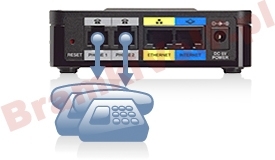 | Do bramki VoIP Cisco SPA122 można podłączyć dwa zwykłe telefony lub faksy.
Mogą to być również telefony bezprzewodowe,
jeśli osoby z nich korzystające często przemieszczają się.
Każdy z podłączonych telefonów lub faksów,
może mieć inny numer telefoniczny,
a w jednym czasie mogą być wykonywane niezależnie od siebie jedno lub dwa połączenia telefoniczne lub faksowe.
|
| Do sieci Internet bramkę VoIP Cisco SPA122 podłączysz za pomocą portu sieciowego (gniazdo INTERNET).
W ten sposób podłączamy ją do posiadanego routera,
switcha lub modemu.
Nie musisz martwić się o działanie bramki w sieci,
ponieważ może ona automatycznie pobrać adres IP z sieci (klient DHCP),
można również przypisać do niej na stałe adres IP (statyczne IP). Obsługuje również mechanizmy łączenia się z Internetem w sieciach typu DSL z wykorzystaniem protokołu PPPoE (Point-to-Point Protocol over Ethernet).
| 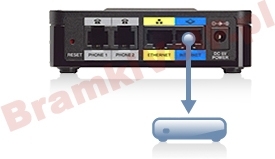 |
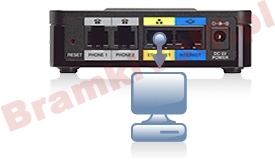 | Bramka VoIP Cisco SPA122 posiada wbudowany router,
dlatego będziesz mógł do niej podłączyć oprócz telefonów,
swój komputer (do gniazda ETHERNET).
Możesz też zamiast komputera podłączyć switch,
aby rozgałęzić sieć i w ten sposób podłączyć kilka komputerów.
|
| Bramka Cisco SPA122 jest prosta w instalacji i konfiguracji,
każdy z dwóch portów telefonicznych w tej bramce VoIP,
może zostać skonfigurowany niezależnie pod inną usługę VoIP (różni operatorzy VoIP).
Interfejs do konfiguracji jest dostępny przez przeglądarkę stron internetowych.
| 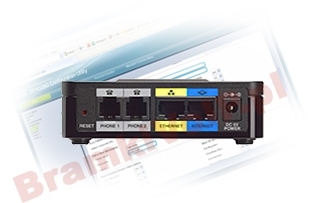
|
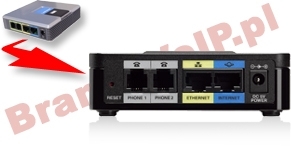 | Bramka VoIP Cisco SPA122 to nowa,
lepsza odsłona cieszącego się od lat zaufaniem użytkowników modelu bramki Linksys SPA2102-EU.
Jest następcą tej popularnej bramki VoIP | Specyfikacja techniczna:
- 1 port WAN 100BASE-T RJ-45 (IEEE 802.3) ze wsparciem dla:
- dynamicznego IP (klient DHCP)
- statycznego IP
- PPPoE
- 1 port LAN 100BASE-T RJ-44 (IEEE 802.3) do którego można podłączyć komputer lub dalszą część sieci (np używając switcha)
- 2 porty RJ-11 FXS (podłączenie dwóch telefonów lub faksów)
- fizyczny przycisk reset
Kodeki:
- G.711 (A-law and μ-law)
- G.726 (32 kbps)
- G.729 A
Diody: Phone 1,
Phone 2,
Internet,
Zasilanie
Zasilacz:
- Napięcie wejściowe DC: 5V DC @ 2.0A maximum
- Zużycie energii: 5W
- Typ przełączania (100-240V) automatyczny
- Zasilacz: 100-240V oraz 50-60 Hz (26-34 VA) wejście AC,
przewód 1.8m
Wymiary: (W x H x D) 101 x 101 x 28 mm
Waga: 153 g
Dopuszczalna temperatura podczas pracy: 0 ~ 45ºC
Dopuszczalna temperatura przechowywania: -25 ~ 70ºC
Dopuszczalna wilgotność podczas pracy 10 ~ 90% bez kondensacji
Dopuszczalna wilgotność podczas przechowywania: 10 ~ 90% bez kondensacji
Zgodność z normami: FCC (Part 15 Class B),
CE,
ICES-003,
A-Tick certification,
RoHS (Restriction of Hazardous Substances),
oraz UL.
Zawartość opakowania: Cisco SPA112 ,
zasilacz 5V/2A,
przewód ethernet 1.8m,
podręcznik użytkownika,
płyta CD.
Szczegółowa specyfikacja (w języku angielskim):
Data networking
- MAC address (IEEE 802.3)
- IPv4 (RFC 791) upgradeable to IPv6 (RFC 1883)
- Address Resolution Protocol (ARP)
- Domain Name System (DNS) A record (RFC 1706) and SRV record (RFC 2782)
- Dynamic Host Configuration Protocol (DHCP) server and client (RFC 2131)
- DHCP client reservation
- DHCP Options 159 and 160
- Point-to-Point Protocol over Ethernet (PPoE) client (RFC 2516)
- Internet Control Message Protocol (ICMP) (RFC 792)
- TCP (RFC 793)
- User Datagram Protocol (UDP) (RFC 768)
- Real Time Protocol (RTP) (RFC 1889) (RFC 1890)
- Real Time Control Protocol (RTCP) (RFC 1889)
- Differentiated Services (DiffServ) (RFC 2475) and type of service (ToS) (RFC 791/1349)
- VLAN tagging (IEEE 802.1p)
- Simple Network Time Protocol (SNTP) (RFC 2030)
- Upload data rate limiting: static and automatic
- QoS voice packet prioritization over other packet types
- MAC address cloning
- Port forwarding
- SIP channels support both UDP and TCP transport
- VPN pass-through with IP Security encapsulating security payload (IPsec ESP),
Point-to-Point Tunneling Protocol (PPTP),
and Layer 2 Tunneling Protocol (L2TP)
Voice gateway
- SIPv2 (RFC 3261,
3262,
3263,
and 3264)
- SIP proxy redundancy: dynamic through use of DNS SRV A records
- Reregistration with primary SIP proxy server
- SIP support in Network Address Translation (NAT) networks (including Serial Tunnel [STUN])
- Highly secure (encrypted) calling using Secure RTP (SRTP)
- Codec name assignment
- G.711 (A-law and μ-law)
- G.726 (32 kbps)
- G.729 A
- Dynamic payload
- Adjustable audio frames per packet
- Dual-tone multifrequency (DTMF): in-band and out-of-band (RFC 2833) (SIP information)
Voice features
- QoS (Ethernet port upstream bandwidth control)
- Independent configurable dial plans with interdigit timers and IP dialing (1 per port)
- Call progress tone generation
- Jitter buffer: Adaptive
- Frame loss concealment
- Full-duplex audio
- Echo cancellation (G.165 and G.168)
- Voice activity detection (VAD)
- Silence suppression
- Comfort noise generation (CNG)
- Attenuation and gain adjustments
- Flash hook timer
- Message waiting indicator (MWI) tones
- Visual messaging waiting indicator (VMWI) using frequency shift keying (FSK)
- Polarity control
- Hook flash event signaling
- Caller ID generation (name and number): Bellcore,
DTMF,
and European Telecommunications Standards Institute (ETSI)
- Streaming audio server: Up to 10 sessions
- Music on hold
- Call waiting,
call waiting and caller ID
- Caller ID with name and number
- Caller ID blocking
- Selective and anonymous call rejection
- Call forwarding: No answer,
busy,
and all
- Do not disturb
- Call transfer,
call return,
and call back on busy
- Three-way conference calling with local mixing
- Per-call authentication and associated routing
- Call blocking with toll restriction
- Distinctive ringing: Calling and called number
- Off-hook warning tone
- Advanced inbound and outbound call routing
- Hotline and warmline calling
- Long silence (configurable time setting) silence threshold
- Disconnect tone (for example,
reorder tone)
- Configurable ring frequency
- Ring validation time setting
- Tip and ring voltage adjustment setting
- Ring indication delay setting
Fax capability
- Fax tone detection pass-through
- Fax pass-through using G.711
- Real-time fax over IP using T.38 fax relay (T.38 support is dependent on fax machine and network and transport resilience)
Security
- Password-protected system reset to factory default
- Password-protected administrator and user access authority
- Provisioning,
configuration,
and authentication
- HTTPS with factory-installed client certificate
- HTTP digest: Encrypted authentication using MD5 (RFC 1321)
- Up to 256-bit Advanced Encryption Standard (AES) encryption
- SIP Transport Layer Security (TLS)
Provisioning,
administration,
and maintenance
- Web browser administration and configuration using integral web server
- Telephone keypad configuration with interactive voice prompts
- Automated provisioning and upgrade using HTTPS,
HTTP,
and Trivial File Transfer Protocol (TFTP)
- TR-069
- Asynchronous notification of upgrade availability using Notify
- Nonintrusive,
in-service upgrades
- Report generation and event logging
- Statistics in Bye message
- Debug and syslog server records: Per-line configurable web browser
- Ping and traceroute diagnostics
- Configuration management: Backup and restore
- Support for Bonjour
Subscriber line interface circuit (SLIC)
- Ring voltage: 40-90 Vpk configurable
- Ring frequency: 20-25 Hz
- Ring waveform: Trapezoidal
- Maximum ringer load: 5 ringer equivalence numbers (RENs)
- On-hook voltage (tip and ring): -46 to -56V
- Off-hook current: 18-25 mA
- Terminating impedance: 600 ohm resistive or 270 ohm + 750 ohm
- 150 nF complex impedance
- Frequency response: 300-3400 Hz
- Return loss (600 ohm,
300-3400 Hz): up to 20 dB
- Insertion loss (1 Vrms at 1 kHz): 3-4 dB
- Total harmonic distortion (THD) (350 mV peak at 300 Hz): up to 3%
- Idle channel noise: 72 dB (typical)
- Longitudinal balance: 55 dB (typical)
- Off-hook threshold (line seizure): Rdc < 1000 ohm
- On-hook threshold (line release): Rdc >10000 ohm
- Rdc DC supervisory range: Rdc > 450 ohm
Gwarancja: 12 miesiecy,
producenta.
|
 News
News
 Bezpieczeństwo i prywatność
Bezpieczeństwo i prywatność
 Formy odbioru i płatności
Formy odbioru i płatności
 Regulamin
Regulamin
 Kontakt
Kontakt
 Czytaj o VoIP
Czytaj o VoIP
